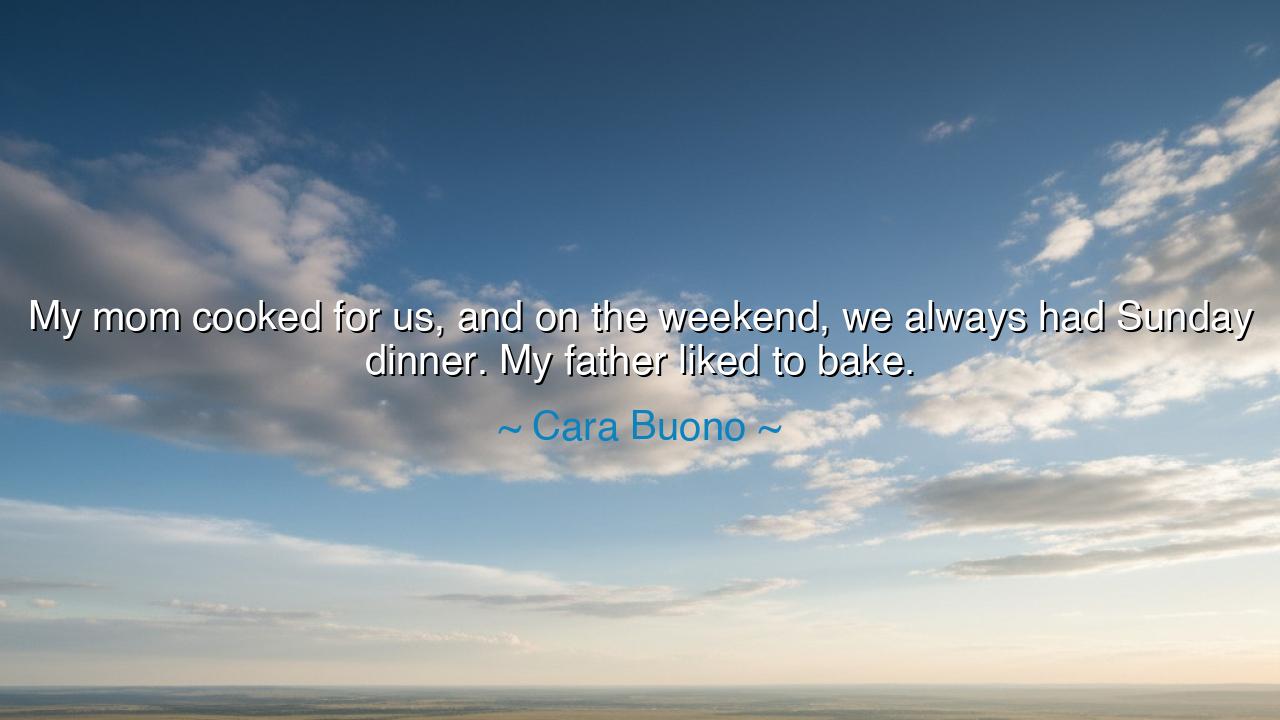
My mom cooked for us, and on the weekend, we always had Sunday
My mom cooked for us, and on the weekend, we always had Sunday dinner. My father liked to bake.






Cara Buono, with words gentle and rooted in memory, once spoke: “My mom cooked for us, and on the weekend, we always had Sunday dinner. My father liked to bake.” Though it seems but a simple recollection of childhood, it carries within it the timeless wisdom of family, of tradition, and of the sacredness of the table. For in these acts of cooking and baking lies not merely the preparation of food, but the weaving of bonds, the passing down of love, and the shaping of identity across generations.
The ancients revered the hearth as holy. To them, fire was not only warmth and sustenance, but the beating heart of the household. The Greeks honored Hestia, goddess of the hearth, while the Romans built shrines to Vesta, whose flame symbolized the life of the people. In Cara’s memory of her mother cooking and her father baking, we hear echoes of this ancient reverence: food as ritual, as offering, as the rhythm that sustains not just bodies but souls.
The Sunday dinner itself has long been a sacred tradition. It is the day when work is set aside, when family gathers, when stories are told and laughter flows as freely as wine. Across cultures, the communal meal is a sign of unity, a weekly renewal of bonds. In medieval villages, the Sunday feast after worship was often the only time the whole community sat together. In Cara’s family, as in countless others, it was the weekly reminder that amidst the world’s busyness, there is always time to return to one another.
Consider also the symbolic beauty of the father baking. In many traditions, the act of making bread was holy work. The Israelites remembered manna from heaven, the Greeks offered loaves to their gods, and Christians spoke of bread as life itself. A father who bakes, then, is not merely preparing food—he is embodying the timeless role of provider, giving not only sustenance but a piece of himself to his children. Each loaf is a lesson: love takes form in labor, and labor becomes love.
History offers us the story of Abraham Lincoln’s mother, Nancy Hanks Lincoln, who was remembered not for wealth or power, but for the meals she prepared in a humble frontier cabin. Though her son would rise to greatness, he often recalled her care and sacrifice at the family hearth. Just as Cara Buono’s parents shaped her memories through simple meals, Lincoln’s character was shaped by the warmth of food, family, and the endurance of love in simplicity.
The wisdom of Cara’s quote is clear: greatness is not found only in extraordinary moments, but in the ordinary rituals repeated with love. The meals of childhood become the foundation of memory, the anchors of identity, the inheritance that no one can take away. To sit at a table where mother cooks and father bakes is to be nourished not only in body but in spirit, for such acts teach patience, gratitude, and belonging.
Therefore, let us not despise the small rituals of our own lives. Let us cherish the shared meal, the bread made with care, the dinner that gathers loved ones together. In a world where many rush and scatter, let us return to the table as to a sacred altar. Prepare food with love, eat with gratitude, and pass on traditions that root the heart in joy.
For in the end, the lesson of Cara Buono’s words is this: family is forged not in grand gestures, but in the simple acts of care, repeated faithfully. A meal prepared, bread baked, laughter shared—these are the true treasures of life. Carry them forward, and you will find that even when years pass and voices fade, the memory of love around the table will remain, eternal as the flame of the hearth.






AAdministratorAdministrator
Welcome, honored guests. Please leave a comment, we will respond soon